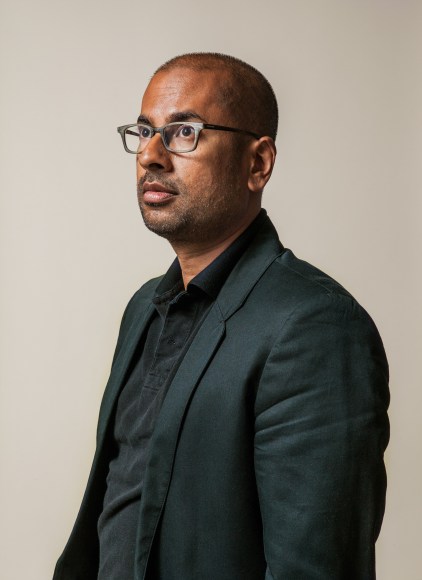Rumaan Alam has one of the summer’s biggest literary sensations with Rich and Pretty—a first novel that, like many of its kind, draws upon the author’s own experience. “I think it’s a not uncommon experience for gay boys, young men, and even older men to spend a lot of time in the company of women,” Alam says. “When I was a little boy, all of my pals are girls, and when I went to college the same held true, and then when I left college and went into the work force, I worked at fashion magazines, and it’s a place where women really run the show.”
Women are on center stage in Rich and Pretty, a novel whose title says it all: One luxuriates in her wealth and the other in her beauty, both rubbing up against an age when shiftlessness begins to lose its appeal. Alam’s history writing about fashion and interior design helped shed light upon the world of wealth: “Class is very, very fertile territory for American artists and it has been for a long time,” he says.
For all that Rich and Pretty seems like the book Alam, with his experience among women and the idle, was meant to write, he’s aware that within the hermetic world of publishing, whose whiteness makes any difference all the more pronounced, it appears to be a departure. “I felt so unable to write the kind of book that I think people who I seem to be on paper would be expected to write,” he says. “I felt unable to write about first-generation immigrants, which I am. I felt unable to write a book about gay men, which I am. I felt unable to write a book about gay fatherhood.” Instead, he considered matters such as motherhood and marriage—less common for a male writer and outside of the demographic box in which he might otherwise have been placed.
Alam’s parents emigrated from Bangladesh in the 1970s—his father was an architect, and his mother a doctor, in the suburbs of Washington, D.C., a place he describes as “a place of absolutely no place. I think that’s helpful for me. Lauren, one of the protagonists, has this suburban chip on her shoulder. And that’s a very common kind of American attitude, and that is the attitude I possess.” Alam went to Oberlin, in Ohio, and has spent the years since graduation in New York City, where Rich and Pretty is set. “It is a great immigrant story,” he says, “the children of doctors and lawyers and engineers who end up becoming artists or art directors. In many ways, it’s probably the oldest story in America.”
Living in Brooklyn with his husband and two children, about whom he memorably wrote in the New York Times, Alam had to work with his husband to reorganize his life in order to complete his novel. “I missed a lot of the day-to-day of my children and I started feeding them fishsticks. I normally spend a lot of time making dinner for the kids, and I decided I couldn’t care about all of those things in that period of time. And that is how I got through the sheer act of sitting at the computer and writing, is by taking other things off of my plate. Time is a finite resource. If you reapportion your time, you might find it, but you probably won’t get to watch any prestige television and you probably will have to skip all the playdates.”
Today, Alam’s book is a critical sensation of the sort that helps define a young writer’s reputation. And Alam is pushing back against the kind of pre-evaluation that the publishing industry encourages. “When you are what we call a minority writer, a writer of color, a writer of any kind of difference, there is some kind of presumption of autobiography in everything you produce. And I find that really maddening and I resist that. I could have written a book about women in saris and failing to learn my parent’s tongue. But in a way the novel that I wrote feels more autobiographical to me. I wanted to write a work that showed my respect for the women who are my closest friends.”


